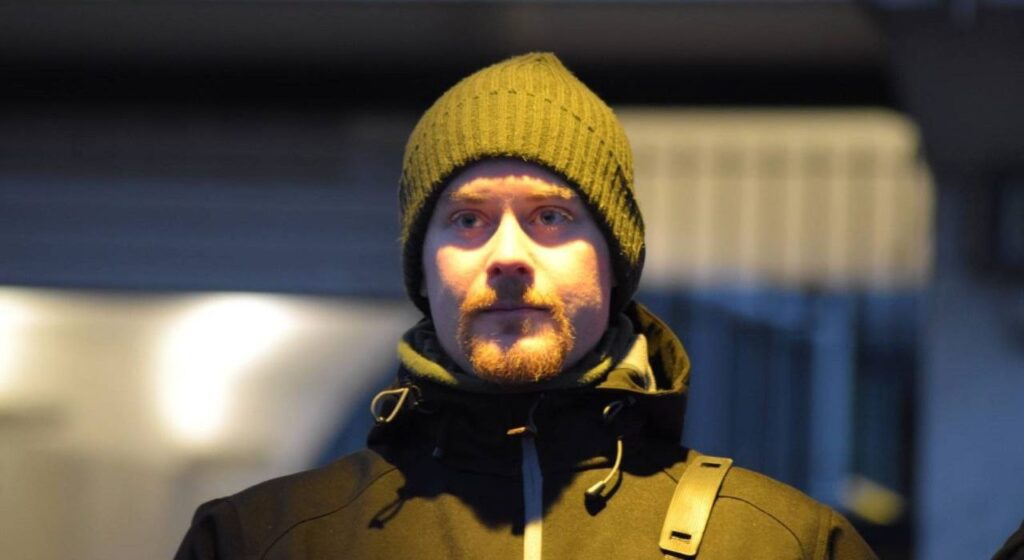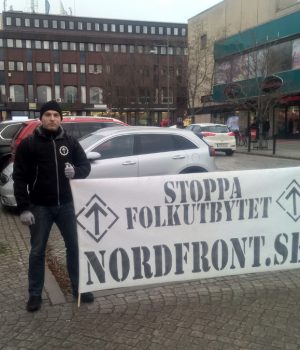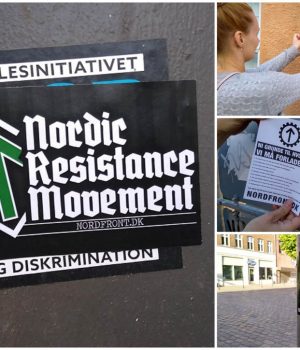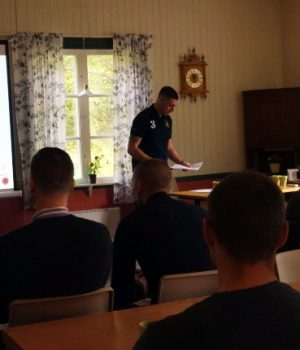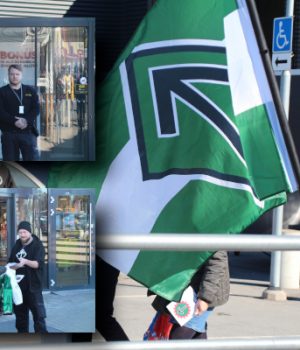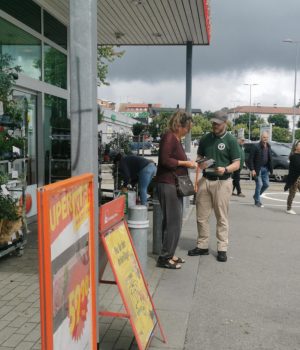RESISTANCE MOVEMENT. After years of harassment by Stockholm Police, activist Joakim Kannisto has reported the Police Authority to the Chancellor of Justice. Here, Joakim tells us about how he has been subjected to house raids, unwarranted car stops and drug tests.
Joakim Kannisto is one of the most active activists in Sweden’s Nest 1 and is also well-known to Swedish readers as one of the hosts of the Mer än ord (More Than Words) activist podcast. Because of this, he has become a target for political harassment by the police. The security police agency Säpo have also targeted Joakim, reporting him to social services in 2020, along with other parents active in the Resistance Movement. When Nordfront.se investigated Säpo’s social services reports and asked questions about Joakim’s case, Joakim was sent a sinister text message by a Säpo agent, who stated he was now “extra interested” in Joakim. Not long after this, the Handelsbanken bank informed Joakim he was no longer welcome as a customer.
However, it has primarily been Stockholm Police who have targeted Joakim over the years. Nordfront has investigated Joakim’s case, reviewing several police reports, Joakim’s own account of events and his various complaints against the police.
Joakim says the harassment began in 2019, after he started becoming increasingly active in the Nordic Resistance Movement. He also began writing political posts under his own name on social media, various forums and in comment sections. That year, two police officers searched Joakim’s apartment, on the grounds that it “smelled of cannabis outside the door”. According to the police report, Joakim showed “clear signs of being under the influence of drugs”. In the report, the police claimed Joakim had “glassy, bloodshot eyes” and that he “behaved nervously”.
Because Joakim does not use drugs and was at home with his children when the police broke in, he became upset and questioned the police’s actions, leading to him being handcuffed. During the house search, the police dug through Joakim’s garbage and confiscated some old loose snuff they claimed was hash, informing him he was under suspicion of drug offences.
The police took Joakim for a drug test, while the National Forensic Centre was tasked with testing his old snuff. Unsurprisingly, the test showed that Joakim did not have any drugs in his system. The Swedish police can use more or less fabricated suspicions about drug use to conduct house searches. Assertions of someone “looking tired” or having “red eyes” are completely subjective, while the introduction of up to six months’ imprisonment for minor drug offences (use of drugs) means the police can use such evaluations as a pretext to search someone’s home. In practice, minor drug offences are punishable by a fine and, as far as Nordfront is aware, never result in a prison sentence.

After the incident, Joakim told Nordfront he received an amusing call from the National Forensic Centre.
“They asked if I wanted to claim ownership of the confiscated item; in other words, my old loose snuff, which, according to the centre for forensics, contained tobacco and nicotine.”
Joakim believes the police are well aware that drug addicts live in the neighbouring apartments in his stairwell. He says the police chose to search his home, instead of those of the known addicts, when they smelled the drugs, just so they could harass him.
Traffic stops and circular reasoning
Joakim is also regularly stopped by the police when driving. On these occasions, his car is usually searched.
Joakim explains: “When they stop me, they constantly come up with very shady circular reasoning; for example, they are stopping me because they have stopped me before. Sometimes the cops say it’s because of earlier discoveries of knives and street fighting weapons in my car, even though I’ve never been convicted for that, and sometimes they claim it’s because I associate with ‘violent criminals’. But they can never give examples of any ‘violent criminal’ I associate with.”
The police use Police Laws PL19 and PL20, which regulate their right to search people and vehicles for weapons when they make traffic stops. But the police regularly abuse the Police Laws.
“According to the legislative history available for PL20, there must be at least a reasonable suspicion that a weapon is inside the vehicle. The police must also make it clear what type of object they think they will find and where it is located in the vehicle.”
But in Joakim’s case, the police usually justify PL20 by saying they have previously used it against him, despite the fact this has never resulted in a conviction. On one occasion, they refused to let Joakim watch while they searched his car. The police did not allow him to have an independent witness present during the search, instead explaining that “he did not have any rights here”. The officers also refused to identify themselves, asserting that Joakim’s request was “ridiculous”. One of them gave Joakim a made-up identification number before they left the scene.
On that occasion – just like other occasions – Joakim was on his way to a political demonstration, which he missed because the police detained him for more than an hour. The officers were also unreasonably heavy-handed despite the fact that Joakim was using crutches after having a knee operation.
Joakim is harassed by the police on his way to a political demonstration (Swedish):
From time to time, the police have searched Joakim’s car and referenced PL20. When they fail to find any weapons, they instead seize political material like leaflets and stickers, without explanation.
Stopped at the workplace and charged with possession of work tools
In January 2020, Joakim’s car was stopped near his workplace. After conducting their usual search, the police found two blunt mora knives, which the activist uses for work. Joakim was charged for breaching the Knife Act but acquitted when the court found that the prosecutor could not disprove the claim that the knives were actually work tools.
“After that search, I’d had enough,” says Joakim. “The cops ripped the front seats in my car, so I reported the damage to the police’s Special Investigations (SU) department. But the case was dropped after they interviewed a few officers, and the SU kept the entire investigation confidential.”
Joakim also made several complaints to the Parliamentary Ombudsman, which led nowhere.
The Chancellor of Justice requests statements from the Police Authority
In view of the harassment he experienced, Joakim decided to report the Police Authority to the Chancellor of Justice (JK). In his complaint, Joakim wrote that he considers his constitutionally protected freedoms and rights to have been violated by the police:
“My right to be free to influence political opinions is being hindered by constant harassment by the police, through continual traffic stops and by the fact I am repeatedly stopped, detained and forced to show identification without suspicion of a crime,” Joakim wrote.
In response to Joakim’s complaint, the Chancellor of Justice requested statements from the Police Authority about the traffic stops, inspections and the house search Joakim details in his report. However, the Police Authority stated they lacked information for several of the incidents and therefore claimed they never happened.
“They cover things up. But when I requested the reports about all the incidents with the support of GDPR, they suddenly appeared,” Joakim explains.

Nordfront has contacted Nordic Resistance Movement activists in various parts of the country to ask if they have experienced similar harassment. Although they report mysterious traffic stops and “routine checks”, it is extremely unusual for the police to act in the same way they do to Joakim, whom they seem to want to harass constantly. When asked about why he believes the police target him so much, Joakim says:
“I am one of the most active activists in Nest 1, in the capital city, the heart of Sodom. Furthermore, I travel a lot by car. For a time, the police stopped me every time they saw me. That has decreased a bit now, which might be because I’ve changed cars.”
Joakim says he is surprised the Chancellor of Justice has chosen to pursue his complaint and request statements from the police. Even so, he is sceptical it will lead anywhere.
“But if the Chancellor of Justice calls in one police officer and just asks questions, that officer might be a little unsure and think twice the next time he plans to harass someone without reason. After all, the police have to follow the law; it’s their own rules.”
Nordfront.se will continue to follow Joakim’s complaint and his attempt to get justice for his treatment by Stockholm Police.


